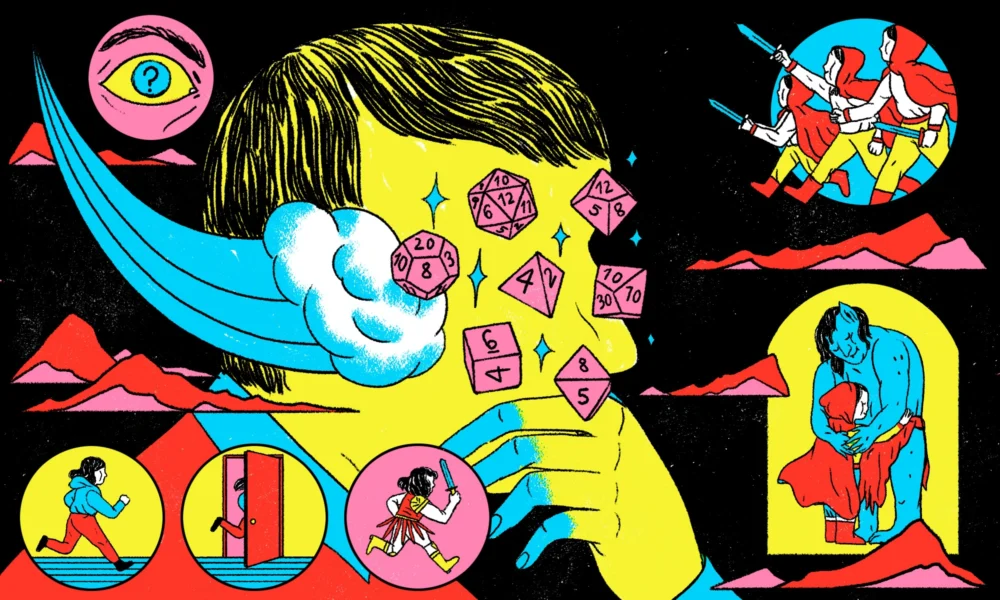The door squeaks on its hinge, and a child, freshly orphaned, emerges from her room and pads toward the cusp of the ornate staircase. Tiny fingers thread through the balusters as she surveys the manor’s foyer.
Our party—seven of us, a rag-tag bunch bound by circumstance and fate—freezes. Waits with bated breath.
“Roll for stealth,” the dungeon master (DM) instructs our party’s wizard, who’s only half-concealed below in the shadow of the handrail. Discovery mid-heist would jeopardize the stability of the city, and also land us in prison. Or worse.
“…natural 20,” my friend says, smug like a sun-warmed cat, syllables stretched in satisfaction.
Filtered through my laptop speakers, the responding chorus is tinny, but our collective relief echoes through the audio.
My friends and I are playing Dungeons and Dragons, commonly abbreviated as D&D. Although some were already veterans of the game during high school, to me the game remained peripheral, overly time consuming and complex. As graduation passed and university lodged its talons into our free time, it wasn’t until the pandemic started that we decided to begin our own campaign.
And we weren’t the only ones: As many turned to online spaces for connection and entertainment during the pandemic, D&D catapulted from the Forgotten Realms back into the zeitgeist. Sales jumped 33 per cent last year, contributing to its six-year growth streak. Originally published in 1974, the fantasy role-playing game has long held a place in popular culture as the quintessential nerd activity. But it has evolved from its roots. The fifth edition, released in 2014, prioritized storytelling over convoluted battle mechanics, attracting new players. While sessions are ideally held in person, online platforms such as Discord and Roll 20 allow sessions to be held regardless of location or time zone separating friends—or even strangers, as avenues like reddit threads or tabletop clubs in local libraries have proliferated.
Though there might not be a physical board to gather around, the game’s framework remains the same. The players design characters, the DM charts quests, and the dice dictate everything in between. Roll a one on a perception check, and my half-elf druid could stumble right into a den of thieves; roll a 20 on a dexterity saving throw, and she might successfully leap to cover.
No other game holds a candle to the complete creative freedom D&D offers. As the adventure unfurls into being, the DM and players can manipulate its strands to weave dynamic, thoughtful narratives, a tapestry suspended between collective imaginations. Visual components like set pieces or miniatures, though they might compliment gameplay, are dressings for the ultimate stage: The theatre of the mind, an endlessly customizable space.
It’s also inherently co-operative: Each member of the party works together during combat, diverting an attack or casting a healing spell, but also collaborates via the role-playing element. Some players value the game mechanics, tailoring warriors with carefully calibrated stats that will deliver the strongest attacks; others, like me, favour the improv aspect, an excuse to exercise intuition and think on the fly. For more still, especially young people, D&D can act as an outlet, an opportunity to project real issues onto fictional avatars in order to safely unpack trauma or experiment with gender expression or personality. In conceptualizing elements of the self onto a new form while remaining omniscient, you can explore your own identity—it’s free group therapy!
What I find most valuable are the memories my friends and I forge together, sharing a laugh over in-game jokes or reflecting when combat goes wrong. As my character levels up with each completed arc, outside the game, I do too. Despite the perpetual essays my major requires, I’ve never considered myself a capital-w Writer. D&D gives me permission to have fun with the craft, and revel in the communal storytelling at its heart.
Our campaign will reach its 1.5 year anniversary in a few days. Even through dozens of six-hour sessions, it’s taken me until now to solidify my character’s identity—a representation, perhaps, of the nebulous distress I’ve felt over these long months. Regardless, I’m proud of us. And not only for our characters’ successful heist, but the story we’ve authored, together.










Well written!